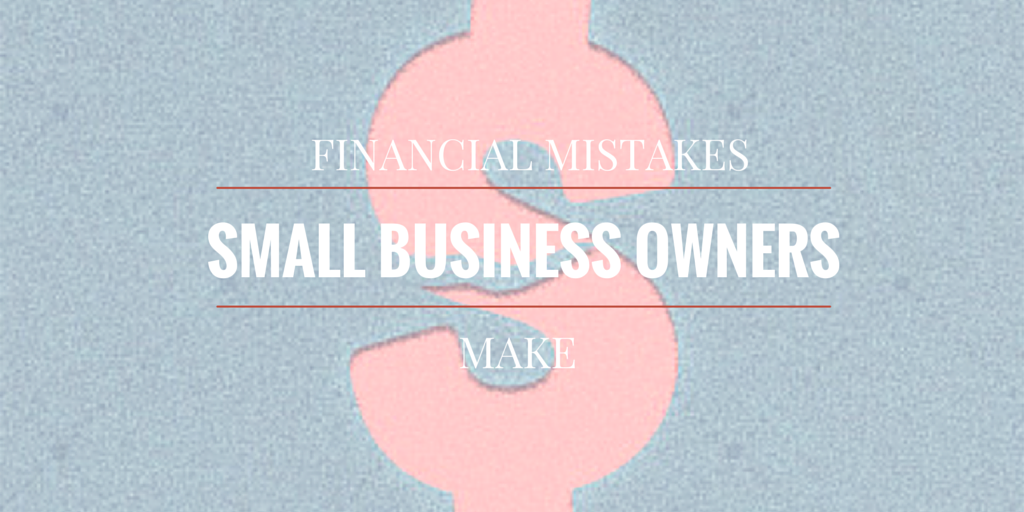 Why is it that the vast majority of small businesses fail to even get off the ground? It can’t be lack of planning because some budding entrepreneurs, who are sticklers for planning and nit-pickers to boot, fail as miserably as the maverick entrepreneurs amongst us. Another interesting fact is that most small businesses can take most types of mistakes in their stride. It is, however, the financial mistakes small businesses make that can truly break them.
Why is it that the vast majority of small businesses fail to even get off the ground? It can’t be lack of planning because some budding entrepreneurs, who are sticklers for planning and nit-pickers to boot, fail as miserably as the maverick entrepreneurs amongst us. Another interesting fact is that most small businesses can take most types of mistakes in their stride. It is, however, the financial mistakes small businesses make that can truly break them.
Therefore, for any budding entrepreneur, nothing is more important than learning the major financial mistakes small businesses make so that he can avoid making them as well. If you’re one such entrepreneur, then we’d like to congratulate you because you’re already ahead of the curve and the chances of your business flourishing in the near future are very high.
So in the spirit of contributing to your bid to become the next bigwig in the world of business, here is a list of top 5 financial mistakes small businesses make on a regular basis.
Financial Mistakes Small Businesses Make #1: Going Overboard with Initial Spending
 Setting up a business is an exciting thing to do. It usually represents everything from a new challenge and a new page in one’s life to improved lifestyle and better potential personal resources. Taking all this into account, is it even surprising that most budding entrepreneurs go overboard with spending in the initial stages of setting up the business?
Setting up a business is an exciting thing to do. It usually represents everything from a new challenge and a new page in one’s life to improved lifestyle and better potential personal resources. Taking all this into account, is it even surprising that most budding entrepreneurs go overboard with spending in the initial stages of setting up the business?
There’s a certain sense of power and control in setting up a new business also. Moreover, in most entrepreneurs’ heads, it makes sense to put in money into their business because they think that the more money, effort, and thought they put into their business, the better it will perform.
It is this sense of power and this thinking that combine to push new entrepreneurs to spend too much in the earlier phases of their businesses. We’re referring to spurious expenses that are passed on as relevant such as vending machines, huge desks, super expensive chairs, high end cars, and even high value premises for the sake of corner offices.
Such expenses rarely add anything special to the business’s productivity and efficiency and should be kept to a minimum. However, it is possible that budding entrepreneurs find it difficult to distinguish between spurious expenses and relevant expenses in the heat of the moment.
Therefore, to avoid such financial mistakes small business make, new businesses need to have a system for evaluating and scrutinising every possible expense with respect to its cost to benefit ratio.
Financial Mistakes Small Businesses Make #2: Diversifying or Experimenting too Soon
 There’s nothing more heartening and inspiring than a new venture taking off the ground just the way the entrepreneur imagined it would. However, the feeling of achievement and exhilaration created by such success can have a detrimental effect in the future of the business.
There’s nothing more heartening and inspiring than a new venture taking off the ground just the way the entrepreneur imagined it would. However, the feeling of achievement and exhilaration created by such success can have a detrimental effect in the future of the business.
These feelings can further lead to the entrepreneur feeling invincible and capable of taking on any challenge. This can push entrepreneurs to overreach their personal and businesses’ capabilities. The typical example is of new businesses that try to diversify or experiment right after they break even financially.
Breaking even is the most important goal for any new business. However, breaking even doesn’t mean that your business has become armoured against risks. One bad move or one poor decision can easily put you into losses again.
The reason why early diversification and experimentation are seen as common financial mistakes small businesses make is that those decisions are taken at the wrong time. Right when a new start-up breaks even is the time for consolidation as opposed to diversification and experimentation.
It is a period in which the business needs to solidify its revenues and lock in its assets. Diversification and experimentation should only be initiated once the existing revenues have been made relatively fixed.
As an exception, it is important for us to add that, in some business sectors and industries, diversification and experimentation may not be counted as common financial mistakes small businesses make. These are sectors in which they are counted as strengths because the markets are terribly saturated with the usual products.
Financial Mistakes Small Businesses Make #3: Ignoring the Need for Cash Reserves
 Have you ever wondered why is breaking even so important to businesses? The reason for this is that most entrepreneurs assume that the earlier periods of their start-up’s lifespan will be dominated by losses. Typically, businesses assume a minimum of six months to be a period of losses.
Have you ever wondered why is breaking even so important to businesses? The reason for this is that most entrepreneurs assume that the earlier periods of their start-up’s lifespan will be dominated by losses. Typically, businesses assume a minimum of six months to be a period of losses.
It is a fair assessment too because most start-ups need a period of about six months to become fully functional. Everything from buying assets and raw materials to gaining supply contracts and getting products into the market is done in this period.
Every start-up, no matter how minimalistic in nature, will need funds to operate through its earlier periods. This is why not having sufficient cash reserves is one of the worst financial mistakes small business make.
Even when a business has established itself in the market and consolidated its position, keeping cash reserves is recommended. Cash reserves will act as the business’s buffer against lean periods in the market. Without this buffer, it is possible that a small lean period will result in the death of a business.
Financial Mistakes Small Businesses Make #4: Thinking that Being Busy is Sufficient
 You may not think that this is serious enough to be included in the worst financial mistakes small businesses make but if you only give it a little more thought, you will realise that you’re wrong. Why is being efficient different from being busy? Why is being efficient better than being busy?
You may not think that this is serious enough to be included in the worst financial mistakes small businesses make but if you only give it a little more thought, you will realise that you’re wrong. Why is being efficient different from being busy? Why is being efficient better than being busy?
Have you ever wondered why efficiency was the first thing that most businesses sought out when the great recession hit the world in 2008? Efficiency, in simple terms, is maximum utilisation of every resource at the business’s disposal. Being busy on the other hand is doing something just for the sake of doing.
Since no business resource is greater than its human resource, it isn’t surprising that efficiency trumps being busy every single time. While it may seem incredibly obvious to you now, this is something that a business owner needs to keep in mind all the time.
It cannot get lost in the everyday business hustle bustle because that will result in efficiency falling by the wayside and being busy getting false importance.
Financial Mistakes Small Businesses Make #5: Overpaying Taxes & Compliance Commitments
 When revenues are huge, every single percent counts towards the profit of the company. This is why large corporations have armies of accountants and even greater armies of lobbyists. The objective of both these groups of professionals is the same i.e. ensuring that the company doesn’t pay too much in the form of taxes.
When revenues are huge, every single percent counts towards the profit of the company. This is why large corporations have armies of accountants and even greater armies of lobbyists. The objective of both these groups of professionals is the same i.e. ensuring that the company doesn’t pay too much in the form of taxes.
The same can’t be said for smaller businesses because they don’t worry about paying their taxes so much. However, in the long run, even small businesses end up paying large sums of their hard-earned money towards taxes. Unfortunately, this is a mistake.
Don’t get us wrong. We’re not the proponents of tax evasion. What we are alluding towards are the legal methods of saving taxes. There are plenty of legal avenues that small businesses can take to save money on taxes and compliance fees. The reason why overpaying taxes is one of the more prominent financial mistakes small businesses make is that they overpay despite there being completely viable legal options at their disposal.
Leave a Reply